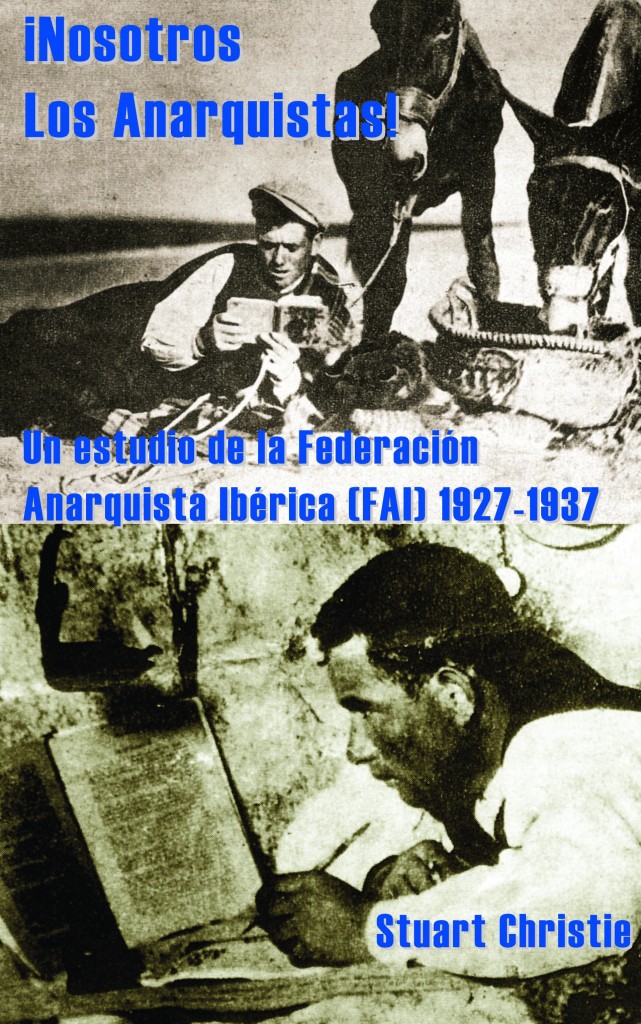 EL ECO DE LOS PASOS. Juan García Oliver. El anarcosindicalismo en la calle, en el Comité de Milicias, en el gobierno, en el exilio. eBook — £1.50/€2.00/$2.50 direct from the CB eBookshelf
EL ECO DE LOS PASOS. Juan García Oliver. El anarcosindicalismo en la calle, en el Comité de Milicias, en el gobierno, en el exilio. eBook — £1.50/€2.00/$2.50 direct from the CB eBookshelf
KINDLE MARKETS: UK : £3.51 ; USA : $5.00 ; FRANCE : €4.63 ; GERMANY : €4.63 ; SPAIN : €4.63 ; ITALY: €4.63 ; NETHERLANDS : €4.63 ; JAPAN : ¥ 594 ; CANADA : CDN $7.06 ; BRAZIL : R$ 20.47 ; AUSTRALIA : $7.14 ; INDIA : R338 ; Mexico : $92.21 — KOBO : EL ECO DE LOS PASOS: EL ANARCOSINDICALISMO En la calle En el Comité de Milicias En el gobierno En el exilio by Juan García Oliver. £10.00
La autobiografía extraordinaria de Juan García Oliver, escrita a sus 71 años desde el exilio en México y publicada originalmente por Ruedo Ibérico. En ella se narran, con prosa ágil y hasta frenética en este extraordinario testimonio, los acontecimientos de su extraordinaria vida, desde sus precoces actividades sindicales, participaciones en huelgas y encarcelaciones, hasta su nombramiento como Ministro de Justicia y su doloroso periplo de exiliado por medio mundo.
Tras muchos años de silencio y de huir de todo tipo de protagonismo histórico, desde su exilio mexicano Juan García Oliver da a la publicidad sus Memorias. Anarcosindicalista de la primera hora, hombre bregado en huelgas y luchas revolucionarias, este antiguo camarero, huésped asiduo de los más duros penales de la dictadura primorriverista, había de convertirse en una de las figuras políticas claves del bando republicano. Su intervención resultó decisiva para la continuidad de la legalidad republiblicana en Catalunya tras la derrota de las fuerzas insurrectas y más tarde, siendo ya ministro de Justicia, había de convertirse en hombre-puente a quien confiar el allanamiento y suavización de los antagonismos que enfrentaban a las fuerzas en el seno de la República.
De sí mismo, Juan García Oliver ha dicho: “Mi muerte será gris y posiblemente llegue con demasiado retraso.” Más de medio siglo de actividad militante hacen imposible una biografía sucinta, a la manera clásica, que mar- que los hitos más importantes de su vida. Lo importante en García Oliver es el hilo conductor, la coherencia íntima de sus actos.
A modo de introducción
Este no será un libro completo. Tampoco será una obra lograda. Sobre la CNT -CNT igual a anarcosindicalismo- se ha escrito bastante. Y se ha escrito por haberse revelado como la única fuerza capaz de hacer frente a los militares españoles sublevados contra el pueblo. Fue la CNT -los anarcosindicalistas- la que impidió, por primera vez en la historia, que un ejército de casta se apoderase de una nación mediante el golpe de Estado militar. Hasta entonces, y aún después, nadie se opuso a los militares cuando en la calle y al frente de sus soldados asestaban a su pueblo un golpe de Estado. La sublevación de julio de 1936 era de carácter fascista y al fascismo europeo, en la calle y frente a frente, ningún partido ni organización había osado enfrentarlo. La CNT -los anarcosindicalistas- no logró hacer escuela en las formaciones proletarias del mundo entero. Otros golpes de Estado han sido realizados después por militares. El de Chile, por ejemplo, frente a casi los mismos componentes que en España -socialistas, comunistas, marxistas-, pero sin anarcosindicalistas, fue para los militares un paseo. Tal como se está explicando lo ocurrido en Chile, la lección para los trabajadores será nula. Porque no fueron los militares quienes mataron a Allende, sino la soledad en que lo dejaron. Algo muy parecido le ocurrió al presidente de la Generalidad de Cataluña, Luis Companys, en el movimiento de octubre de 1934. Entonces, como ahora, predominaba en Europa una manifestación del comunismo, gritón, llorón, dado a difamar a cuantos no se doblegan al peso de sus consignas. Bueno, sí, para organizar desfiles aparatosos en Madrid, en Barcelona, en Santiago, en Berlín. Pero, al trepar al poder Hitler en Alemania, solamente el anarquista individualista holandés Van der Lubbe tuvo el arranque de pegarle fuego al Parlamento, desafiando las iras de quien se creía más poderoso que los dioses. Aquel fuego purificador alumbró la sordidez del mundo comunista, pagado de sus periódicos, de sus desfiles, de sus manifestaciones, pero que, carente de la chispa insurreccional de los anarcos, siempre dejó libre el paso a los enemigos de la libertad. No amando la libertad, no son aptos para defenderla.
La CNT tuvo excelentes luchadores, hombres y mujeres capaces de llenar páginas de Historia. Pero careció de intelectuales capaces de describir y de teorizar nuestras gestas.
Durante años he vivido en la duda de si debía eternizarse nuestras luchas en narraciones veraces. El final de Allende, asesinado por la soledad en que lo dejaron sus partidarios, me ha convencido de que convenía que el mundo obrero conociera lo que éramos colectivamente, y no solamente a través de la imagen de un hombre y de un nombre. La CNT dio vida a muchos héroes. En la medida de lo posible deben irse aportando ya los materiales de la verdadera historia del anarcosindicalismo en su aspecto humano, más importante que las manifestaciones burocráticas, que tanto se han prodigado. Solamente la veracidad puede dar la verdadera dimensión de lo que fuimos.
La verdad, la bella verdad, sólo puede ser apreciada si, junto a ella, como parte de ella misma, está también la fea cara de la verdad. — Juan García Oliver
Continue reading »










